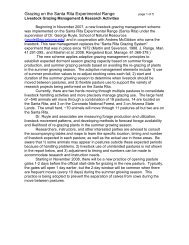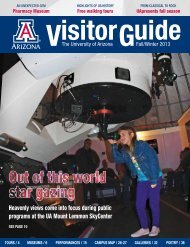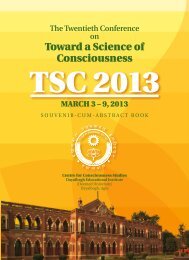CONSCIOUSNESS
Download - Center for Consciousness Studies - University of Arizona
Download - Center for Consciousness Studies - University of Arizona
- No tags were found...
Create successful ePaper yourself
Turn your PDF publications into a flip-book with our unique Google optimized e-Paper software.
1. Philosophy 65<br />
consciousness in recent philosophy of mind. Those who take a higher-order approach to philosophical<br />
theories of consciousness claim that to be in a conscious mental state is to have a<br />
higher-order awareness of oneself as being in that state. The initial motivation for such an approach<br />
is the alleged pretheoretical acceptability of what David Rosenthal calls the ‘Transitivity<br />
Principle’: the claim that conscious mental states are those states we are conscious of being<br />
in. It has been alleged, however (for instance, by Ned Block) that the intuitive acceptability<br />
of the Transitivity Principle merely marks a linguistic connection between the locutions ‘conscious<br />
state’ and ‘state one is conscious of’, and that there is no reason to suppose that such a<br />
linguistic connection, even if it were analytic, provides a good starting-place for an empirical<br />
theory of consciousness. In this paper, I discuss three possible sources of justification for<br />
acceptance of the Transitivity Principle: phenomenological, conceptual/linguistic, and experimental.<br />
I argue, following Uriah Kriegel, among others, that the main source of justification<br />
for the Transitivity Principle for most of us is phenomenological rather than experimental or<br />
conceptual: we accept the Transitivity Principle on the basis of first-person experience. The<br />
immediate acceptability of the Transitivity Principle upon the slightest reflection might lead<br />
one to suppose that the connection between conscious states and states that we are conscious<br />
of is merely conceptual, but I argue that in reflecting on the Transitivity Principle, we engage<br />
in an act of introspection, and that it is this act of introspection that motivates our acceptance<br />
of the principle. In reflecting on our conscious mental states, we come to realize that consciousness<br />
of those states always accompanies them. The status of the Transitivity Principle<br />
is, then, that of a metaphysical claim about the necessary coextensiveness of ‘conscious state’<br />
and ‘state one is conscious of’, initially based on a generalization from one’s own experience,<br />
but easily supplemented by third-person considerations, and, one hopes, eventually, by scientific<br />
investigation. It may seem that there is a difficulty with this proposal: if we have no way<br />
to fix the reference of ‘conscious state’ except with the description ‘state one is conscious of’,<br />
then the Transitivity Principle does after all turn out to express a linguistic triviality. I argue<br />
against this objection that the meaning of ‘conscious state’ is constituted by a rich network of<br />
connections to related notions such as the unconscious, reportability, subjective experience,<br />
and the like. Thus, our discovery that it is of the nature of conscious states that we are conscious<br />
of them is a genuine one. C2<br />
52 Prefrontal Lesion Studies Cast Doubt on Higher-Order Theories of<br />
Consciousness Benjamin Kozuch (Philosophy, Cognitive<br />
Science, University of Arizona, Tucson, AZ)<br />
In this talk, I will argue the following: A prediction of some higher-order (HO) theories of<br />
consciousness is that brain areas in and around the prefrontal cortex are necessary for visual<br />
consciousness; but lesions to these areas do not result in any loss of visual consciousness;<br />
therefore, we have strong evidence against these HO theories of consciousness. HO theories<br />
(as presented by Rosenthal, Kriegel, Carruthers, and others) hypothesize that a necessary<br />
condition upon some mental state being conscious is that it be represented (in some suitable<br />
way) by a HO state. Such theories are committed to there being some brain area(s) such that,<br />
because they produce these HO representations, their normal operation is necessary to visual<br />
consciousness. Let’s call these ‘integral’ areas. An important prediction of a HO theory, then,<br />
is that lesioning of integral area(s) should cause a loss (to some degree) of visual consciousness.<br />
It is probably only areas in and around the prefrontal cortex (PFC) that produce the<br />
proper kinds of HO representations, as it is here that executive and monitoring functions are<br />
carried out. But, as Pollen has pointed out, numerous studies have shown even bilateral lesions<br />
to these areas to be not sufficient for causing a loss of visual consciousness. Among other<br />
things, such subjects still experience ‘primary’ visual qualities like color. This is true even<br />
in the case of lesions to the dorsolateral PFC, a brain area that some HO theorists (Kriegel,<br />
Lau) have thought to produce the requisite kinds of HO representations. It seems, then, that an<br />
important prediction of HO theories has not been met: When those brain areas that are likely<br />
to produce the appropriate kinds of HO representations are lesioned, there is no loss of visual<br />
consciousness. Here, the HO theorist can respond in various ways. I will consider what I take<br />
to be the strongest responses. There are some experimental data (due to Lau, Dahaene, Del







